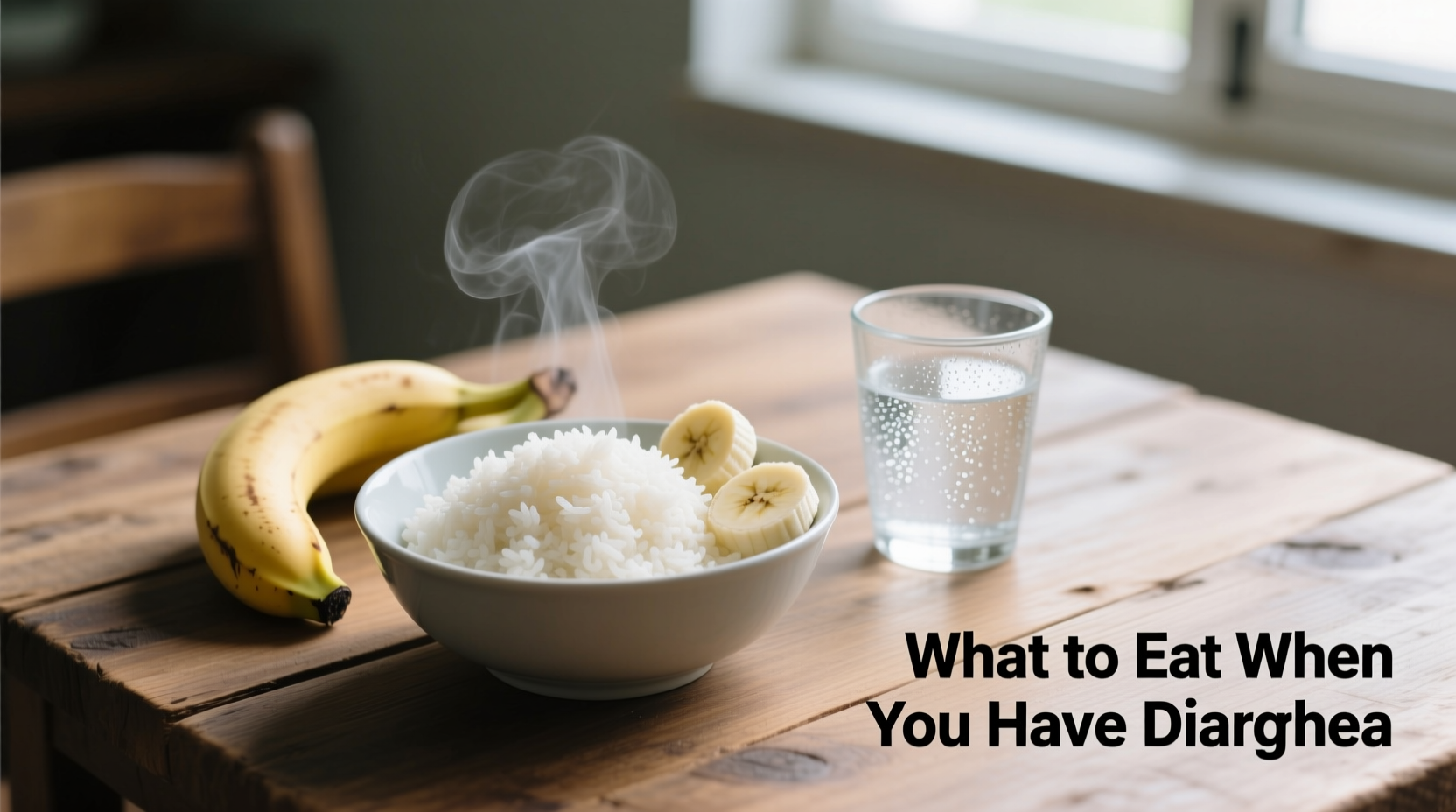Your Immediate Action Plan for Diarrhea Relief
When diarrhea strikes, your body loses fluids and electrolytes rapidly. The American College of Gastroenterology confirms that proper nutrition during this time can shorten your recovery by 24-48 hours. Within the first few hours, prioritize rehydration before introducing solid foods. Start with small sips of oral rehydration solution (ORS), which contains the precise balance of salts and sugars your body needs.
What to Eat During the Acute Phase (First 24 Hours)
During the initial stage when symptoms are most severe, your digestive system needs easily digestible foods that won't irritate your sensitive gut. The CDC recommends these evidence-based options:
- Oral rehydration solutions - More effective than water alone for replacing lost electrolytes
- Clear broths - Provide sodium and hydration without fat
- White rice - Binding properties help firm stools
- Boiled potatoes (without skin) - Easy to digest carbohydrates
- Applesauce - Contains pectin which helps absorb excess fluid
According to Mayo Clinic research, consuming small, frequent meals (every 2-3 hours) of these bland foods helps your digestive system recover faster than fasting.

Recovery Timeline: What to Eat as Symptoms Improve
Your recovery follows a predictable pattern if managed properly. This timeline reflects guidance from the UK's National Health Service based on clinical evidence:
| Recovery Stage | Recommended Foods | Foods to Avoid |
|---|---|---|
| Acute Phase (0-24 hrs) | ORS, clear broths, white rice, applesauce | All dairy, fatty foods, high-fiber foods |
| Early Recovery (24-48 hrs) | Toast, boiled potatoes, oatmeal, steamed carrots | Dairy, spicy foods, caffeine, alcohol |
| Late Recovery (48-72 hrs) | Lean proteins (chicken, fish), cooked vegetables, probiotic yogurt | Raw vegetables, beans, greasy foods |
| Full Recovery (72+ hrs) | Gradual return to normal diet | Continue avoiding irritants until completely symptom-free |
Critical Foods to Avoid During Diarrhea
Certain foods can worsen symptoms or prolong recovery. The World Health Organization identifies these common dietary triggers:
- Dairy products - Lactose intolerance often develops temporarily during gastrointestinal illness
- Fatty or fried foods - Increase intestinal contractions and worsen diarrhea
- High-fiber foods - Raw fruits, vegetables, and whole grains can be too stimulating
- Caffeine and alcohol - Both act as diuretics, worsening dehydration
- Artificial sweeteners - Sorbitol and mannitol have laxative effects
When Standard Recommendations Don't Apply
While these dietary guidelines work for most cases of acute diarrhea, certain medical conditions require different approaches:
- Diabetes patients should monitor blood sugar closely as ORS contains sugars
- Chronic conditions like IBS or Crohn's disease may need specialized dietary management
- Children under 5 require pediatric-specific rehydration formulas
- Immunocompromised individuals should consult a doctor immediately
The CDC emphasizes that diarrhea lasting more than 48 hours in adults (24 hours in children) requires medical evaluation to rule out bacterial infections or other serious conditions.
Proven Recovery Strategies That Work
Based on clinical studies, these approaches significantly improve recovery time:
- Probiotics - Research in the American Journal of Clinical Nutrition shows specific strains like Lactobacillus rhamnosus reduce diarrhea duration by 25%
- Zinc supplementation - Particularly important for children in developing countries
- Gradual reintroduction - Add one new food every 6-8 hours to identify triggers
- Hydration tracking - Aim for urine that's pale yellow, not dark
When to Seek Medical Attention Immediately
While most diarrhea cases resolve with dietary management, these warning signs require prompt medical care:
- Signs of severe dehydration (dizziness, dark urine, dry mouth)
- Blood or black stools
- Fever above 102°F (39°C)
- Symptoms lasting more than 48 hours in adults
- Inability to keep fluids down for 12+ hours
According to gastroenterology specialists, never attempt to stop diarrhea with over-the-counter medications during the acute phase if you have fever or bloody stools, as this can trap harmful bacteria in your system.
Sample 72-Hour Recovery Meal Plan
This practical plan follows medical guidelines for progressive reintroduction of foods:
- Day 1: ORS (½ cup every 15 mins), clear broth, ¼ cup white rice with 2 tbsp applesauce
- Day 2: ORS as needed, ½ cup oatmeal, 1 slice toast with honey, boiled carrots
- Day 3: Small portions of baked chicken, steamed zucchini, probiotic yogurt
Remember to eat slowly and stop before feeling full. Your digestive system needs time to readjust after illness.











 浙公网安备
33010002000092号
浙公网安备
33010002000092号 浙B2-20120091-4
浙B2-20120091-4